GDELS Sites Heritage
GDELS-Santa Bárbara Sistemas (Spain)
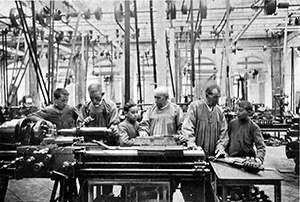 As one of the oldest defense companies in the world, the origins of Santa Bárbara Sistemas date back several centuries. Factories such as the one in Seville, founded in 1540, were the first to produce 24-caliber cast iron canons in Spain in 1777. These include the Oviedo Arms Factory, founded in 1794, and a factory in Trubia, that produced tanks in 1926.
As one of the oldest defense companies in the world, the origins of Santa Bárbara Sistemas date back several centuries. Factories such as the one in Seville, founded in 1540, were the first to produce 24-caliber cast iron canons in Spain in 1777. These include the Oviedo Arms Factory, founded in 1794, and a factory in Trubia, that produced tanks in 1926.
The various factories and technical facilities built later often became major industrial centers promoting the economic and technological development of Spain.
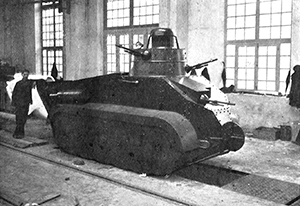 In 1960, Santa Bárbara Sistemas was founded, following a regrouping of various factories that belonged to the Spanish Ministry of Defense. The Spanish National Industrial Institute (Instituto Nacional de Industria) was the main shareholder of this newly founded company.
In 1960, Santa Bárbara Sistemas was founded, following a regrouping of various factories that belonged to the Spanish Ministry of Defense. The Spanish National Industrial Institute (Instituto Nacional de Industria) was the main shareholder of this newly founded company.
25 July 2001 was a key date in the history of the company as it was integrated into the Combat Systems Group of General Dynamics Corporation, one of the main global providers of defense systems and services. This was clearly a result of the evolution of the company in line with its commitment to excellence in advanced technological products.
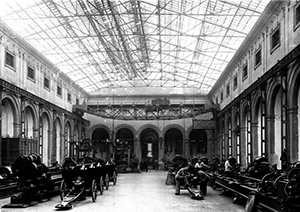 The privatization of the company resulted from a project of the Spanish Government to rationalize and consolidate state-owned industry within the private sector. By electing General Dynamics, Santa Bárbara Sistemas was given a new boost in order to develop its business on an international scale, while still following its initial objectives and commitments to promote research, development and the sale of defense products.
The privatization of the company resulted from a project of the Spanish Government to rationalize and consolidate state-owned industry within the private sector. By electing General Dynamics, Santa Bárbara Sistemas was given a new boost in order to develop its business on an international scale, while still following its initial objectives and commitments to promote research, development and the sale of defense products.
GDELS-Santa Bárbara Sistemas has its headquarters in Madrid and major factories in Sevilla and Trubia; Sevilla has major capabilities for vehicle assemblies and represents GDELS’s Centre of Excellence for Tracked Vehicles and Trubia is today a major welding and production center for the business unit.
GDELS-Steyr (Austria)
 The long history of this company dates back to the early nineteenth century. The growth and development of Steyr-Daimler Puch Spezialfahrzeug GmbH is the result of almost 140-years of growth and consolidation of three significant Austrian enterprises: Österreichische Waffenfabrik, Daimler Motorengesellschaft and Puch Werke Graz.
The long history of this company dates back to the early nineteenth century. The growth and development of Steyr-Daimler Puch Spezialfahrzeug GmbH is the result of almost 140-years of growth and consolidation of three significant Austrian enterprises: Österreichische Waffenfabrik, Daimler Motorengesellschaft and Puch Werke Graz.
For decades, the Steyr-Daimler-Puch Group was one of the leading industrial corporations in the country, manufacturing cars, tractors, buses, trucks, cycles and armored vehicles.
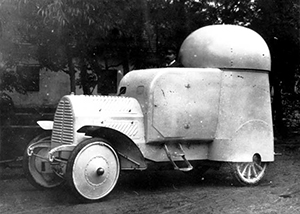 The foundation of the legendary small arms production set up to supply the Imperial Austrian Army with the "Austro Daimler", was launched in 1905.
The foundation of the legendary small arms production set up to supply the Imperial Austrian Army with the "Austro Daimler", was launched in 1905.
As early as 1916, buses and military trucks were produced at the plant. After the Second World War the plant was reconstructed. The company then went on to extend its premises by purchasing additional land from the city of Vienna in the 1980s.
When the headquarters of the Steyr-Daimler-Puch AG were destroyed by fire, they were moved to the plant in Simmering. Since 1997, only military vehicles have been designed and produced at the plant.
GDELS-Germany (Germany)
The origins of GDELS-Germany date back to 1864, when the former EWK Eisenwerke Kaiserslautern was founded. Until the 1950s the company's main products were iron and steel constructions for the buildings and road bridges, cast-iron ovens and heating systems.
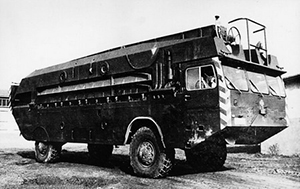 The development and production of the amphibious bridging and ferrying system GILLOIS-EWK in the early 1950s, marks the beginning of a successful product line of various types of bridge systems. Today GDELS-Germany's advanced Amphibian M3 is the most modern and fastest amphibious bridging and ferrying system worldwide.
The development and production of the amphibious bridging and ferrying system GILLOIS-EWK in the early 1950s, marks the beginning of a successful product line of various types of bridge systems. Today GDELS-Germany's advanced Amphibian M3 is the most modern and fastest amphibious bridging and ferrying system worldwide.
In the 1970s, the Foldable Float Bridge was developed and produced by EWK. The performance of this floating bridge system has been improved steadily and it is now being produced as Improved Ribbon Bridge.
Various other mobile dry-gap and floating bridge systems e.g. German Beaver Tank Bridge have been developed and produced by the company in the past 60 years. For all of them high-tensile aluminum alloys have become the material of choice, making the company one of the world's leading welding experts for this kind of material.
As the world-market leader for Western floating bridges and ferry systems, GDELS-Germany is today GDELS’s Centre of Excellence for Bridge Systems and Aluminum, welding.
GDELS-Mowag (Switzerland)
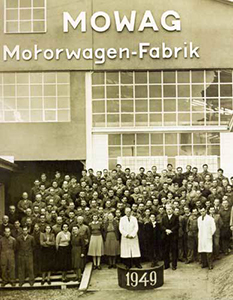 The Motorenfabrik MOWAG was founded in 1950 as a privately owned company by Engineer Walter Ruf. During the past 60 years, MOWAG has concentrated on the development and production of specialized vehicles for the defense sector.
The Motorenfabrik MOWAG was founded in 1950 as a privately owned company by Engineer Walter Ruf. During the past 60 years, MOWAG has concentrated on the development and production of specialized vehicles for the defense sector.
A significant, initial success was the development and production of more than 1,600 troop carriers "MOWAG 4x4" for the Swiss Army in 1962. Contracts for Germany followed between 1961 and 1968, with 750 MOWAG armored wheeled vehicles produced for the German Federal Border Guard (Bundesgrenzschutz) under license by the German industry.
Further high-powered wheeled and tracked vehicle series were developed and manufactured for the world markets.
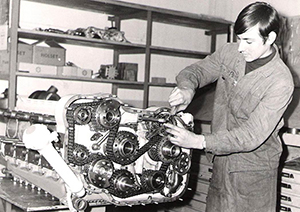 Initiated as a private venture by MOWAG, the first PIRANHA was designed as a family of vehicles that included 4x4, 6x6 and 8x8 configurations. Development started in the early 1970s, and the first prototype was completed in 1972. In February 1977, Canada placed an initial order for 350 PIRANHAS in the 6x6 configuration.
Initiated as a private venture by MOWAG, the first PIRANHA was designed as a family of vehicles that included 4x4, 6x6 and 8x8 configurations. Development started in the early 1970s, and the first prototype was completed in 1972. In February 1977, Canada placed an initial order for 350 PIRANHAS in the 6x6 configuration.
This order was then increased to 491 vehicles. By late 1981, orders increased to almost 900 PIRANHAS. Today the most successful Western wheeled armored vehicle family PIRANHA comprise more than 11'000 PIRANHA with more than 20 customers worldwide.
GDELS-Mowag is today GDELS‘s Centre of Excellence for Wheeled Armored Vehicles and the major supplier for driveline and mobility technology within General Dynamics.
